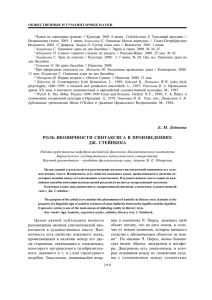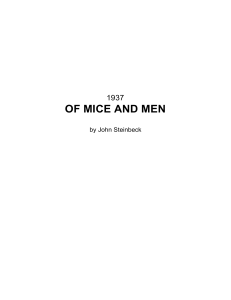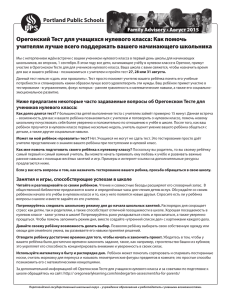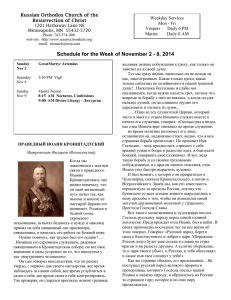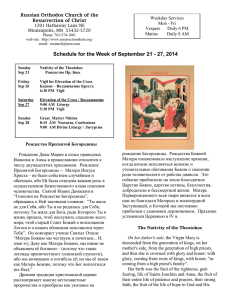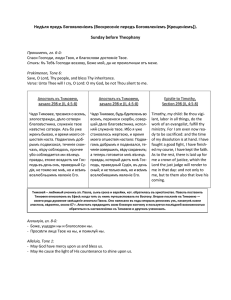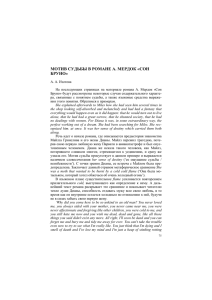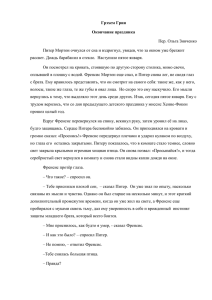To chapter 1
advertisement
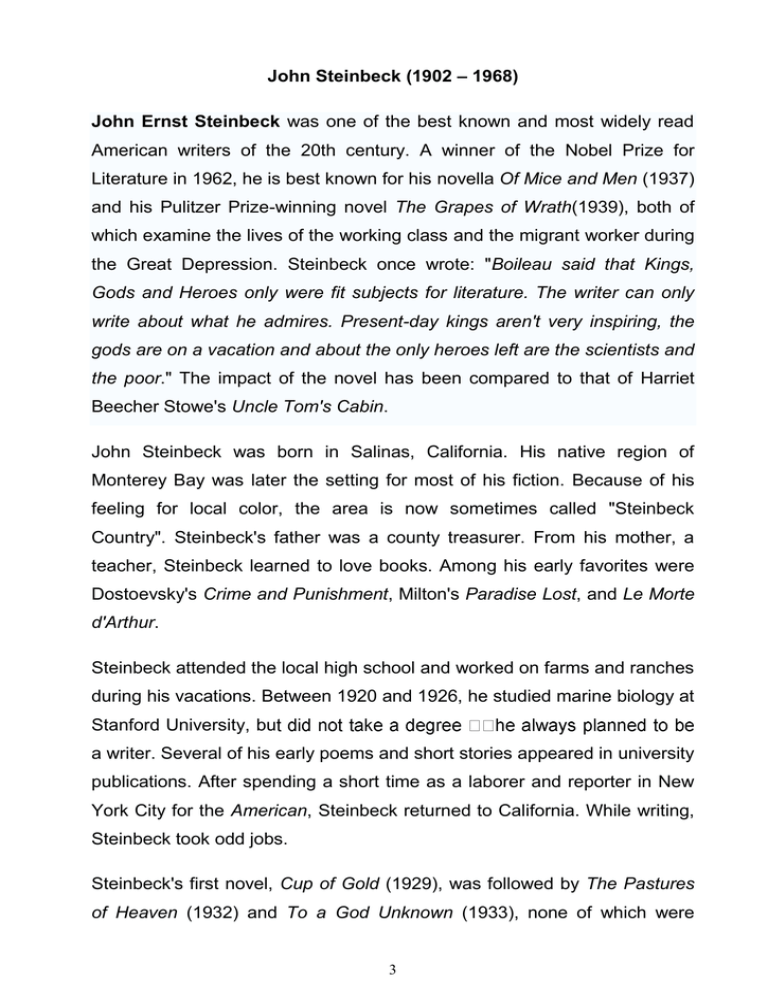
John Steinbeck (1902 – 1968)
John Ernst Steinbeck was one of the best known and most widely read
American writers of the 20th century. A winner of the Nobel Prize for
Literature in 1962, he is best known for his novella Of Mice and Men (1937)
and his Pulitzer Prize-winning novel The Grapes of Wrath(1939), both of
which examine the lives of the working class and the migrant worker during
the Great Depression. Steinbeck once wrote: "Boileau said that Kings,
Gods and Heroes only were fit subjects for literature. The writer can only
write about what he admires. Present-day kings aren't very inspiring, the
gods are on a vacation and about the only heroes left are the scientists and
the poor." The impact of the novel has been compared to that of Harriet
Beecher Stowe's Uncle Tom's Cabin.
John Steinbeck was born in Salinas, California. His native region of
Monterey Bay was later the setting for most of his fiction. Because of his
feeling for local color, the area is now sometimes called "Steinbeck
Country". Steinbeck's father was a county treasurer. From his mother, a
teacher, Steinbeck learned to love books. Among his early favorites were
Dostoevsky's Crime and Punishment, Milton's Paradise Lost, and Le Morte
d'Arthur.
Steinbeck attended the local high school and worked on farms and ranches
during his vacations. Between 1920 and 1926, he studied marine biology at
Stanford University, bu
a writer. Several of his early poems and short stories appeared in university
publications. After spending a short time as a laborer and reporter in New
York City for the American, Steinbeck returned to California. While writing,
Steinbeck took odd jobs.
Steinbeck's first novel, Cup of Gold (1929), was followed by The Pastures
of Heaven (1932) and To a God Unknown (1933), none of which were
3
successful. He first achieved popularity with Tortilla Flat (1935), an
affectionately told story of Mexican-Americans. However, the theme of the
book
remained well hidden from the readers and critics as well. Steinbeck's
a long time, but now he was paid thousands of dollars for the film rights to
Tortilla Flat.
Seventeen of his works, including Cannery Row (1945) and The Pearl
(1947), went on to become Hollywood films, and Steinbeck himself
achieved success as a Hollywood writer, garnering an Academy Award
nomination for Best Writing forAlfred Hitchcock’s Lifeboat, in 1945.
His other works include: In dubious battle (1936 - a strike novel set in the
California apple country), The red pony (1937 – where the reader follows
Jody's initiation into adult life, in which the pony of the title functions as a
symbol of his innocence and maturation), The moon is down (1942 - about
resistance movement in a small town occupied by the Nazis), Cannery Row
(1945 - an account of the adventures and misadventures of workers in a
California cannery and their friends), The Pearl (1947- a symbolic tale of a
Mexican Indian pearl diver Kino), A Russian journal (1948 - an account of
the author's journey to the Soviet Union with the photographer Robert
Capa), East of Eden (1952 - a long family novel, set in rural California in
the years around the turn of the century. In the center of the saga, based
partly on the story of Cain and Abel, is two families of settlers, the Trasks
and the Hamiltons, whose history reflect the formation of the United States,
when "the Church and the whorehouse arrived in the Far West
simultaneously...").
The winter of our discontent (1961), set in contemporary America, was
Steinbeck's last major novel. The book was not well received, and critics
4
considered him an exhausted. Not even the Nobel Prize changed opinions.
The New York Times asked in an editoria, whether the prize committee
might not have made a better choice. Steinbeck took this public humiliation
hard. In later years he did much special reporting abroad, dividing his time
between New York and California. He went to Vietnam to report on the war,
and the New York Post attacked him for betraying his liberal past.
Steinbeck died of heart attack in New York on December 20, 1968.
The day after Steinbeck's death in New York City, reviewer Charles Poore
wrote in the New York Times: "John Steinbeck's first great book was his
last great book. But Good Lord, what a book that was and is: The Grapes
of Wrath." Poore noted a "preachiness" in Steinbeck's work. But he
asserted that "Steinbeck didn't need the Nobel Prize - the Nobel judges
needed him." Poore concluded: "His place in [U.S.] literature is secure. And
it lives on in the works of innumerable writers who learned from him how to
present the forgotten man unforgettably."
The novella Of Mice and Men (1937)
The title is a reference to the Robert Burns poem "To a Mouse."
This story of shattered dreams became Steinbeck's first big success.
Steinbeck adapted it also into a three-act play, which was produced in
1937. The play was rapidly adapted into a 1939 Hollywood film. In 1992
another version was directed by Gary Sinise and starring John Malkovich.
The story is about two travelling ranch workers, George and Lennie, trying
to work up enough money to buy their own farm. It encompasses themes of
racism, loneliness, prejudice against the mentally ill, and the struggle
for personal independence.
Of Mice and Men is a gem, one of Steinbeck's most endearing texts
because, in part, it charts the unlikely friendship of two men of the road (like
5
Natty Bumppo and Chingachgook - also migrants). It is the quality of that
friendship that may first attract readers, as it is fully evoked in the first
chapter. The two depend on one another rather like husband and wife,
father and son-or ego and id, brain and brawn. The interpretations are
many. Clearly George has the words and plans, and Lennie has the heart
and affection and devotion. Theirs can be seen as a sentimental story - and
has been by some critics - but for most readers the bonds of friendship
resonate throughout the text.
The characters assembled around these two represent either power or
powerlessness. The ranch owner, Curley, and Curley's wife have varying
degrees of power. The men in the bunkhouse, on the other hand, have little
control over their lives - they are living from job to job, and some cling
desperately to their jobs - like old Candy or, exiled to the barn, the black
man Crooks. One of the reasons that Lennie and George's relationship is
so unusual to the other characters in the novel is that each is in his/her way
a loner; and the book is as much about loneliness and isolation as it is
about the power of friendship to cut against those conditions.
Of Mice and Men is also about a dream - "livin' off the fatta the land," as
Lennie articulates repeatedly. It's a dream of male self-sufficiency, of land
ownership, of independence, of a home, of a family re-envisioned. The
book suggests the possibilities that have always been inherent in the
American experience, and that is one reason for its long popularity.
Questions and tasks.
Chapter 1.
I. Listen to the introductory episode and find the English equivalents
for the expressions in bold type: (words marked * are explained in
Vocabulary Notes)
6
A few miles south of Soledad*, the Salinas River* drops in close to*
the hillside bank and runs deep and green. The water is warm too, for it
has slipped twinkling over the yellow sands in the sunlight before reaching
the небольшая заводь. On one side of the river the golden foothill slopes
curve up to the strong and rocky Gabilan mountains*, but on the valley side
the water is lined with trees— ивы fresh and green with every spring,
carrying in their lower leaf junctures the debris of the winter’s flooding; and
платаны with mottled, white, recumbent limbs and branches that arch
over the pool. On the sandy bank under the trees the leaves lie deep and
so crisp that a lizard makes a great skittering* if he runs among them.
Rabbits come out of the brush to sit on the sand in the evening, and the
damp flats are covered with the night tracks of ‘coons, and with the spread
pads of dogs from the ranches, and with the split-wedge* tracks of deer
that come to drink in the dark.
There is a path through the willows and among the sycamores,
тропа, протоптанная мальчишками coming down from the ranches to
swim in the deep pool, and beaten hard by бродягами who come wearily
down from the highway in the evening to найти пристанище у воды. In
front of the low horizontal limb of a giant sycamore there is an ash pile
made by many fires; the limb is worn smooth by men who have sat on it.
1) Steinbeck is regarded a master of description. What images does he
create to make the scene so picturesque?
II. Listen further (till the words: “I bet it was more than four miles.
Damn hot day.”) and offer the English equivalents for the following
words and phrases:
цапля
вышли на поляну
они шли один позади другого
7
идти, волоча ноги
не размахивать руками
опустился на землю
почти врезался в него
пил большими глотками, фыркая как лошадь
попей вволю
проточная вода
в двух шагах
1) Now the main characters (Lennie and George) appeared. Where did
they come from?
2) What did they look like? Did they resemble each other in
appearance? How do their looks characterize them?
3) Tell what they were doing at the water.
4) What were they talking about? Were they in good mood? Why?
III. Listen to the excerpt “Lennie looked timidly over to him.
“George?”………… “Awright. You got that. But we’re gonna sleep
here because I got a reason.” Say whether these statements are true
or false:
1) Lennie forgot where he and George were going to.
2) Lennie lost his work-ticket.
3) George had something in his pocket.
4) It was Lennie who killed the mouse.
5) Now at last Lennie knew their destination.
6) The two men were going to work on a rancho in Wede.
7) George told Lennie to keep his mouth shut when they got a new
job.
8) George was happy to have Lennie by his side.
8
Pay attention to some more expressions from this fragment:
Ей-богу
плевать, что я говорил
его лицо стало напряженным
Ленни тихо бубнил себе под нос
IV. (can be given as home task) Listen up to the end of George and
Lennie’s conversation (till the words “The sycamore leaves whispered
in a little night breeze”.) and answer the questions:
1) In the opening scene of the 1939 Lewis Milestone film of Of Mice and
Men, Lennie carries a dead bird, not a mouse. The studio thought
that a mouse would be too unsettling for the audience, particularly a
female audience. Why is a mouse a more appropriate image?
2) What did the men have for supper?
3) What did Lennie pick up and how did George react to his find?
4) Who hadn’t allowed Lennie to keep mice in his past?
5) Why did the idea of finding a cage in the mounting occur to Lennie ?
6) What did George promise to give Lennie when at the new place?
7) A jungle is a roadside hobo camp; the first recorded reference to the
term was to "Hobos Jungles," used in 1908. Why do Lennie and
George first stop at a jungle rather than go directly to work? Why is it
here, and only here, that the entire dream that Lennie and George
share is articulated?
8) What did George advise Lennie to do when in trouble?
Chapter 2.
I. Listen to the description of the place the two companions came to
and the people they met. Pay attention to the following expressions,
reproduce the situations they were used in (up to “The old swamper
looked quickly at him,….”):
9
барак
койка
метла
вши
расправить складку на одеяле
дать конюху взбучу
горбун
деревянная щеколда поднялась
коренастый человек
жилет
пряжка
шпоры
II. Listen till the words “At that moment a young man came into the
bunk house.” Suggest the English variants for the following words
and phrases from this part of the novella:
босс прищурился
он не разговорчив
сильный как вол
чего ты его расхваливаешь
он глуповат
ссыпать ячмень в мешки
копали сточную яму
когда звук шагов затих
Джордж напустился на Ленни
держать пасть на замке
не делать ошибок
выглянул за дверь
овчарка
10
State whether these statements are true or false:
1) The boss wrote Murray and Ready he wanted two men that morning.
2) It was Murray and Ready’s fault George and Lennie were not there
for work that morning.
3) The boss said suddenly, “Listen, Small!” Lennie raised his head.
“What can you do?” Lennie answered, “I can do anything you tell
me.”
4) Lennie wasn’t bright but he could put up a four hundred pound bale.
5) Lennie was George’s cousin. George promised Lennie’s old lady to
take care of him.
III. Listen further (till the words “George laid down his cards
thoughtfully, turned his piles of three.”) and offer the English
equivalents for the following words and phrases:
напрягся
слегка присел
съежился
резко повернулся
посмотрел успокоившись
руки все еще согнуты в локтях
какого черта ему надо?
он горяч
приставать к кому-либо
лезет в драку с большими ребятами
затеять драку
тасовать карты
проститутка (разг.)
1) It is known that when Steinbeck was writing the novel, he repeatedly
asked acquaintances for the word for someone who swept out a
11
bunkhouse; finally he remembered "swamper." This anecdote illustrates
Steinbeck's desire to use the precise language of workers. Find other
examples of Steinbeck's facility with language.
2) Several characters are identified through their hands and what they do
with their hands. Comment.
IV. Listen up to the end of the chapter (“The dog raised his head, but
when Curley jerked out, the grizzled head sank to the floor again.”)
and answer the following questions:
1) What did George tell Lennie to do if he got in any trouble?
2) How did Curley's wife look like when she appeared in the
doorway? What was the men's reactions to her?
3) Why did Lennie want to get away from that place? Was his fear
justified?
4) Give character sketches of the new guys that came into the
bunkhouse.
5) What did Lennie ask George to do after Slim and Carlson’s
conversation?
Chapter 3.
I. Listen to the chapter in portions and answer the questions:
1) What fascinated Slim so much about George and Lennie traveling
together?
2) Why did George like Lennie?
3) Why did Lennie obey George?
4) What had happened in Weed?
5) How does the episode with the puppy characterize Lennie?
6) Describe the relations between men at the rancho judging by the
situation with Candy’s dog.
7) What was the dream of George and Lennie?
12
8) Why was Candy so interested in the idea of having their own
house?
9) How did Candy persuade George to share the future house?
10) What happened when Slim, Curley, Carlson and Whit came back
into the bunk house?
11) What is significant about Lennie’s last words: “I di’n’t mean no
harm, George.”
Chapter 4.
I. Listen to the introductory episode of chapter 4 and find the English
equivalents for the expressions in bold type:
Crooks, the Negro stable buck, had his bunk в комнате для
хранения сбруи; a little shed that leaned off the wall of the barn. On one
side of the little room there was a square four-paned window, and on the
other, a narrow досщетчатая door leading into the barn. Crooks’ bunk
was a long box filled with straw, on which his blankets were flung. On the
wall by the window there were деревянные гвозди on which hung
broken harness in process of being mended; strips of new leather; and
under the window itself a little bench for leather-working tools, curved
knives and needles and balls of linen thread, and a small hand riveter. On
pegs were also pieces of harness, a split collar with the horsehair stuffing
sticking out, a broken hame,* and a уздечка with its leather covering split.
Crooks had his apple box over his bunk, and in it a range of medicine
bottles, both for himself and for the horses. There were cans of saddle
soap* and a протекающую can of tar with its paint brush sticking over the
edge. And scattered about the floor were a number of личные вещи; for,
being alone, Crooks could leave his things about, and being a stable buck
and a cripple, he was more permanent than the other men, and he
накопил more possessions than he could carry on his back.
13
Crooks possessed several pairs of shoes, a pair of rubber boots, a
big alarm clock and a одноствольный shotgun. And he had books, too; a
потрепанный dictionary and a истерзанный copy of the California civil
code for 1905. There were battered magazines and a few dirty books on a
special shelf over his bunk. A pair of large gold-rimmed spectacles hung
from a nail on the wall above his bed.
This room was swept and fairly neat, for Crooks was a proud,
держащийся отстраненно man. He kept his distance and demanded
that other people keep theirs. His body was bent over to the left by his
crooked spine, and his eyes lay deep in his head, and because of their
depth seemed to glitter with напряженностью. His lean face was lined
with deep black wrinkles, and he had thin, сжатые от боли lips which
were lighter than his face.
II. Say whether these statements are true or false:
1) The stable buck lived in a small room that nobody visited because he
was a Negro.
2) One Saturday night he was glad to see Lennie.
3) Lennie told Crooks about their would-be rancho and rabbits.
4) When Candy came, it was difficult for Crooks to conceal his pleasure
with anger.
5) Crooks was glad to have a room all to himself.
6) The stable buck was interested in the project of having their own land
and house.
7) When suddenly Curley’s wife appeared, they didn’t welcome her.
Chapter 5.
Listen to the chapter and offer the English equivalents for the
following words and phrases, reproduce the situations they were
used in:
14
прикрыл щенка соломой
закопано
Ленни снова охватила тоска
смахнул с него сено
он притворился будто хотел меня укусить, а я притворился будто
хотел его шлепнуть
ухаживать за кроликами
из-за тебя мы попадем в беду
я могла бы кое-чего добиться
он работал в кино
ты спятил
нахмурился
гладить волосы
не растрепай их (волосы)
трясла головой в стороны
его лицо исказилось
приглушенный крик
забилась как рыбка
1) Discuss the men's reactions to Curley's wife. Why doesn't she have a
name?
2) When she threatens Crooks, she seems at her worst; why does she
say what she says to him?
3) Does a reader's impressions of her differ when she finally speaks of
her past to Lennie?
15
Chapter 6.
I. Listen to the final chapter and find the English equivalents for the
following words and phrases:
напился, припав губами к воде
птичка затрепыхалась в сухих листьях
он прислушивался, озираясь
она была чистая и накрахмаленная
она встала, подбоченясь
я говорила тебе слушаться Джорджа
ты не достоин пятки кроликам лизать
Ленни воинственно возразил
кролик юркнул обратно в голову Ленни
Джордж подошел неуклюже
это не важно
Ленни сказал лукаво
они малость подзаработают, а потом все промотают
сказал дрогнувшим голосом
Джордж поднял пистолет и нацелил его
1) What is the purpose of George making Lennie think about their
"paradise" before he is shot?
2) Does Lennie realize he has done something wrong?
3) Is George being selfish by shooting Lennie? Why or why not?
4) Does Lennie need George more or does George need Lennie more?
5) Why does George claim he acted in self-defense?
6) Did George have to kill Lennie? Often in high school classrooms,
mock trials are set up to try George for first or second degree murderor to pardon him. What would your response be to the killing?
16
7) Work in groups of four and make a script of an alternative final scene
with George and Lennie. Try to answer the questions, "What would
happen if George did not shoot Lennie?" or "What happens to George
after Steinbeck ends his novel?"
8) Upon completing the novel, describe the major and minor characters
in Of Mice and Men. Complete this activity by individually giving a oneword description of a character why you chose a certain word or what
made you describe the character from the book the way you did. Other
characters can be described such as: Lennie, Aunt Clara, Candy,
Curley, Curley's wife, Slim, Carlson, boss, etc.
9) This novel is one of America's most compelling books about
friendship. Compare to other texts whose appeal may also be due in
large part to the quality of the friendships evoked. Is Lennie and
George's dream possible? Why are others attracted to them?
Appendix
1)
Some symbols found in the text: Rabbit, Mouse, Paradise, The old
dog and Lennie, Curley's wife. – What other symbols are present in the
book and what do they represent?
2) What are some prevalent themes in the Of Mice and Men. Upon
making a list work in groups of four to find evidence to support the recurring
themes. Each group will find one piece of evidence for each of the themes.
The following is a list of possible themes throughout the book.
Animals (Lennie described as an Animal) "...and he walked heavily,
dragging his feet a little, the way a bear drags his paws." Chapter 1.
"You'd drink out of a gutter if you was thirsty." Chapter 1.
"Slowly, like a terrier who doesn't want to bring a ball to its master, Lennie
approached, drew back, approached again." Chapter 1.
17
"Lennie covered his face with huge paws and bleated with terror." Chapter
3.
"Want me to tell ya what'll happen? They'll take ya to the booby hatch.
They'll tie ya up with a collar, like a dog." Chapter 4.
"He pawed up the hay until it partly covered her." Chapter 5.
Dreams
They want to be self-reliant: "'Well,' said George, 'we'll have a big
vegetable patch and a rabbit hutch and chickens. And when it rains in the
winter, we'll just say the hell with goin' to work, and we'll build up a fire in
the stove and set around it an' listen to the rain comin' down on the roof...'"
Chapter 1.
Whit brings the letter written by Bill Tenner and everyone is impressed but
unsure as to whether or not he really wrote it. It would be something if a
worker could do this. Some of these men could only dream such a thing.
"We could live offa the fatta the lan'." Chapter 3.
"I could build a smoke house like the one gran'pa had..." Chapter 3.
"An' we'd keep a few pigeons to go flyin' around the win'mill like they done
when I was a kid." Chapter 3.
Childhood is reflected by George and Crooks.
Curley's wife's dream of being an actress.
George must live life without Lennie trying to fulfill their dreams.
18
Landscape
Descriptions of nature along the Salinas River begin and end the text. It
does not change even though the lives of these two characters change
dramatically.
"Evening of a hot day started the little wind to moving among the leaves.
The shade climbed up the hills toward the top. On the sand banks the
rabbits sat as quietly as little gray, sculptured stones." Chapter 1.
The bunkhouse contrasts the beautiful scenery and description of the
outside landscape. "At about ten o'clock in the morning the sun threw a
bright dust-laden bar through one of the side windows, and in and out of
the beam flies shot like rushing stars." Chapter 2.
"Although there was evening brightness showing through the windows of
the bunk house, inside it was dusk." Chapter 3.
"As happens sometimes, a moment settled and hovered and remained for
much more than a moment. And sound stopped and movement stopped for
much, much more than a moment." Chapter 5.
"Already the sun had left the valley to go climbing up the slopes of the
Gabilan mountains, and the hilltops were rosy in the sun." Chapter 6.
"The crash of the shot rolled up the hills and rolled down again." Chapter 6.
19
Vocabulary Notes
To chapter 1
Soledad — г. Соледад; название придумано Стейнбеком, возможно,
по аналогии с названием округа Солано в Калифорнии.
the Salinas River — p. Салинас протяженностью 150 миль в Западной
Калифорнии; в г. Салинас родился Стейнбек, в его доме открыт
музей.
drops in close to... — протекает рядом с...
Gabilan mountains — горная цепь в Западной Калифорнии.
makes a great skittering — проносится как молния.
split-wedge — разделенный и клинообразный.
his hat dripped down — c его шляпы капала вода.
That's all you ever can remember is them rabbits. — Ты помнишь
только о кроликах.
Murray and Ready's — название фирмы.
Weed — вымышленное название населенного пункта.
we're set — зд. мы устроены.
They run us outa Weed — Hac выгнали из Уида.
bustin' a gut {амер, разг.) — изо всех сил; to bust = to burst; a gut
{амер. разг.) = a stomach.
You ain't puttin' nothing over — зд. я не позволю тебе сжульничать.
a cat house (амер. разг.) — публичный дом.
keep me shovin' (сленг) — заставляешь меня таскаться.
You keep me in hot water (сленг) — Ты меня ставишь в трудное
положение.
You get a kick outta that (сленг} — получаешь от этого удовольствие.
work up a stake {сленг) — добыть кучу денег.
they're poundin' their tail {сленг) — тащатся.
that gives a damn about us — кто захочет общаться с нами.
20
blowin' our jack {сленг} — транжиря наши денежки; во время
написания
повести
также употреблялись
такие
стилистически
окрашенные эквиваленты понятия «деньги»: Almighty Dollar bacon,
beans and honey, the bucks, bullets, cabbages, cherries, do-re-mi, the evil,
juice, muck, the needful, rubbish, snow, soap, velvet, и т.д.
An' live off the fatta the lan' = And live off the fat of the land (библейская
аллюзия).
hobo – хобо, странствующий рабочий
To chapter 2
pushbroom — веник с длинной ручкой.
sore as hell — он был зол как черт.
pants rabbits (сленг) — вши.
Then how come he got graybacks (сленг) — так как же он заработал
вшей.
working up a slow anger — медленно разъяряясь.
He was sure burned (сленг) — конечно, он был очень сердит.
I ain't got the poop no more {сленг) — больше я ничего не знаю; роор
(сленг) — факты, информация.
Stetson hat — название фасона шляпы, придуманного Дж. Б.
Стетсоном в середине б0-х годов XIX в.
a bum steer (сленг) — неверная информация.
We couldn't get no rides in the morning — Мы никак не могли
приехать утром.
short two buckers — не хватало двух здоровых парней;
bucker {сленг} — ковбой.
rassel (амер. разг.) = wrestle — зд. бросать, кидать.
swamper — мыть пол.
gang up on — набросятся все вместе.
21
cockier'n ever — как никогда задиристый.
lay — зд. расклад пасьянса.
Purty (диал.) = pretty.
pants is full of ants — очень нервничает.
jerkline — веревка, которой пользуются вместо поводьев;
set up (сленг) — человек, которого легко провести, также — легкое
дело.
we're gonna get the can (сленг) — мы вылетим отсюда.
to plug himself up {сленг) — рекламировать себя.
'em poison — зд. таких ядовитых, т.е. приносящих несчастье.
piece of jail bait (сленг) — особа, которая доведет до тюрьмы.
You leave her be — Оставь ее в покое.
take the rap {сленг) — сесть в тюрьму.
poke (сленг) — кошелек, бумажник, а также карман.
hit a pocket (сленг) — разбогатеть.
the wheeler — зд. мул-коренник.
butt (груб.) — задница, круп.
a blue ball (сленг) — венерическое заболевание.
slang her pups (диал.) — принесла щенков.
To chapter 3
if it don't take no figuring — если не надо долго раздумывать.
string along together — ладите друг с другом.
Auburn — возможно, имеется в виду город в Восточной Калифорнии в
36 милях от Сакраменто.
bust (сленг) — сломать; to bust open (сленг) — взломать.
it jus' works the other way around — бывает и по-другому.
rabbits in (сленг) — бросается и бежит.
the law (сленг) — полиция.
22
pitch shoes — бросать подковы (в игре под названием Horse Shoe
Game).
Carlson was not to be put off — Карлсона было не остановить.
to beat hell — ужасно.
a whing-ding (сленг) — зд. восторг.
get it over with — справиться (с горем).
a Luger — название пистолета.
a looloo {сленг) — «милашка».
You can get a shot for two bits — за пятьдесят центов ты можешь
получить порцию виски; а bit — цвадцать пять центов, обычно
употребляется в словосочетании two bits.
kewpie — c купидонами.
gettin' burned (сленг) — быть обманутыми.
googoos (сленг) — сумасшедшие.
What's eatin' on (сленг) — что мучает?
hoosegow (сленг) — тюрьма; также существовали сленгизмы:
academy, birdhouse, City of Hate, college, grey house, Siberia, stone bag,
rest home, man killer, и т.д.
in San Quentin... — выражение использовалось по отношению к комуто, занимавшемуся амурными делами; ср. San Quentin quail (сленг) —
привлекательная, не достигшая совершеннолетия девушка.
'cots = apricots.
them does would = they would; does служит для усиления.
Hat bust (сленг) — совсем пропали; одно из значений bust —
«провал», «неудача».
squack — звукоподражание, употреблено для эмфазы.
You lay offa me (груб.) — отстань от меня.
to throw a scare inta — испугать.
Leggo of him = Let him go.
will you get the laugh — ты станешь посмешищем.
23
lit into (сленг) — пристал, привязался.
To chapter 4
hame — клешня хомута, хомутина.
saddle soap — мягкое мыло для чистки кожи, изготовляемое с
добавлением специального масла.
They's no call (сленг) — незачем.
You're crazy as a wedge — Ты совсем спятил.
go blabbin' — зд. сплетничать, болтать.
a busted-back nigger {сленг} — черномазый со сломанной спиной.
took a powder (сленг) — ушел, убежал (обычно, не заплатив по
счету).
bored in on him —зд. говорил ему нудным голосом.
booby hatch {сленг) — сумасшедший дом.
Ain't nobody goin' to suppose no hurt to George — Пусть никто не
замышляет навредить Джорджу.
rummy — вид карточной игры.
They never get none under their hand — Они никогда ничего не
приобретают.
throw off of it — зд. прогнать с нее (земли).
a blackjack game — карточная игра («очко»).
to get something on you (сленг) — причинить тебе зло.
One-two (сленг) — комбинация из двух ударов, один — короткий,
внезапный, левой рукой, другой — сильный перекрестный правой
(обычно в челюсть противнику).
you're sellin' me (сленг) — ты мне врешь.
bindle bums (сленг) — рабочие-подешцики, переходящие с одного
места работы на другое; cp. bindle — одеяло, которое свертывают и
несут, перекинув через плечо.
24
bindle stiffs (сленг) = bindle bums.
a dum-dum (сленг) — глупец, дубина.
floozy (сленг) — идиотский.
two-bit job = two bits job — копеечная работа.
corn (сленг) — спиртное.
suckin' the bottom of the glass (сленг) — надираться, напиваться.
roll your hoop (сленг) — занимайся своим делом.
scatter along (сленг) — дуй отсюда.
I got it doped out (сленг} — я знаю, что делать.
To
dope
out
(сленг)
—
понять
значение,
разработать
план
дальнейших действий.
To chapter 5
four-taloned jackson fork — четырехзубые вилы.
tenement (искаж) = tournament — турнир.
was in pitchers — снималась в кино; pitchers = pictures
made a ringer (сленг) — сделал дубль.
it's all off— все кончено.
in meanness — co зла.
I was in on it — я был в этом замешан.
fat (сленг) — хороший; используется обычно для усиления.
shoot him in the guts — я выпущу из него кишки.
keep smb in — сдержать.
To chapter 6
raised hell — устроил скандал.
sonofabitching well — очень хорошо, sonofabitching — усилительное
слово.
25
stew the b'Jesus outa George (сленг) — надоедаешь Джорджу до
чертиков; b'Jesus = blessed Jesus.
jack-pin — штырь для козел.
to ram — зд. загнать.
to jack (диал.) — вытащить.
fambly (диал.) = family.
blow it in — тратить в миг.
that gives a hoot in hell about 'em (разг.) — кто о них позаботится.
jarred — зд. содрогнулся. got to sometimes — иногда приходится.
26
